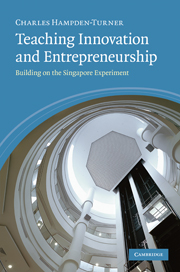Book contents
- Frontmatter
- Contents
- List of grids
- List of dilemmas
- Acknowledgements
- Introduction
- 1 Singapore’s challenge
- 2 The entrepreneurial ecosystem
- 3 How can innovative pedagogies be measured?
- 4 Co-defining innovative education
- 5 The Singapore results
- 6 Results of the Mandarin-speaking programme
- 7 Reconciling values
- 8 ‘It is only the Hawthorne Effect’
- 9 The programme that cannot stand still
- 10 Innovation and the future of the university
- 11 What are the implications of being able to teach innovation?
- 12 Is a new creative class arising?
- Notes
- Bibliography
- Appendices
- General index
- Index of dilemmas and reconciliations
7 - Reconciling values
a helical model of innovative processes
Published online by Cambridge University Press: 05 July 2014
- Frontmatter
- Contents
- List of grids
- List of dilemmas
- Acknowledgements
- Introduction
- 1 Singapore’s challenge
- 2 The entrepreneurial ecosystem
- 3 How can innovative pedagogies be measured?
- 4 Co-defining innovative education
- 5 The Singapore results
- 6 Results of the Mandarin-speaking programme
- 7 Reconciling values
- 8 ‘It is only the Hawthorne Effect’
- 9 The programme that cannot stand still
- 10 Innovation and the future of the university
- 11 What are the implications of being able to teach innovation?
- 12 Is a new creative class arising?
- Notes
- Bibliography
- Appendices
- General index
- Index of dilemmas and reconciliations
Summary
Thus far we have measured the innovative process using square grids, but these fail to reveal how values are actually synthesized or the process by which participants learn to do this. We have seen that you need not just intellect or experience, but both, intellectualized or codified experience. You need not just to absorb top-down instruction but to initiate bottom-up thoughts and actions, or commitments to some of what you have absorbed. Instead of just competing on a metaphorical ‘level playing field’, you need the cooperation of colleagues and an extended ‘family’ that coach and critique your play.
Your product is unlikely to be right first time, so you need many rehearsals before friendly, yet critical, audiences. You need to play with your ideas in a safe place, where failings are understood, but all this is for a very serious purpose, success in the open market for which you must prepare yourself. This helps summarize earlier discussions, but how can these processes be structured in a consistent way? Can we model reconciled values?
VALUE SYSTEMS ARE CIRCULAR AND CYBERNETIC
It has been recognized for some time that values are systems. They are not isolated objects and no sense can be made if they are treated as if they were. Values are not things but differences. Hence top-down is different from bottom-up, cooperating is different from competing and so on. If you doubt this try defining one end of such a continuum without defining the contrasting end. The meaning lies in the difference or contrast. To be playful is not to be serious and vice versa. These values are not only circular but cybernetic. The word comes from the Greek kybernetes meaning ‘helmsman’.
- Type
- Chapter
- Information
- Teaching Innovation and EntrepreneurshipBuilding on the Singapore Experiment, pp. 107 - 127Publisher: Cambridge University PressPrint publication year: 2009



